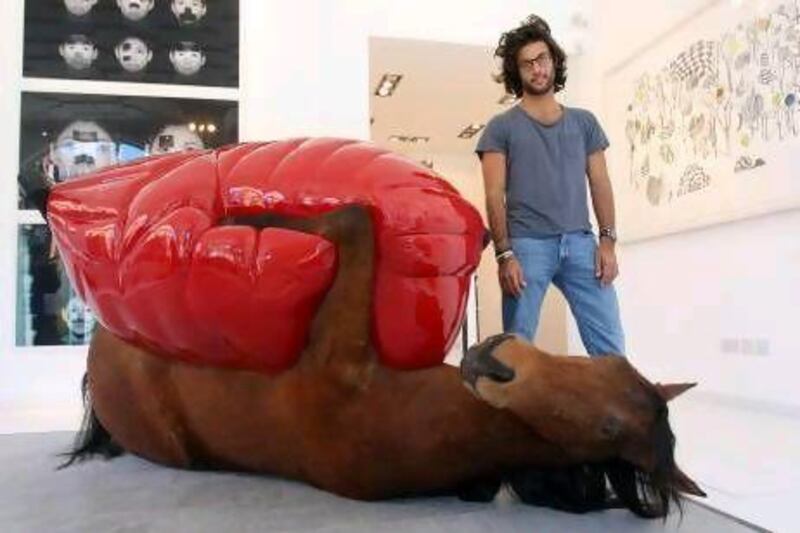Benjamin Khalili, who with his brothers Daniel and Raphael, owns Shizaru Gallery in Mayfair, London, explains how his father's collections of antiquities has influenced his own approach to curating.
Your gallery's new show is called This is London. Can you tell us about it?
We've been open for one year, and we're in a very prime location, and we have a lot of good relationships with all the galleries here, because I and my brothers collect contemporary art as well. So we decided to do a collaboration with all the best galleries in London and the greatest contemporary artists, all UK-based. It's the Olympics, and we wanted to show the English art scene in one space in the centre of London. We've got some of the greatest names in London, from Alison Jackson and Michael Craig-Martin to Soheila Sokhanvari, and you can come here and get an idea of what's going on in the scene.
It must have been quite a task to pull the exhibition together.
It's a very big process. We started a couple of months ago, which made it hard, because normally people plan for something like this eight months in advance, but this is how we work. We like to get pressured. I'm a bit blown away, actually. I'm still taking it all in.
Your father, Professor Nasser D Khalili, is a great collector of art and antiquities. How has that affected your own taste?
My father likes to collect artwork that's not on the radar and he conserves it, researches it, publishes it and then he brings it to people's attention and they're just blown away - they cannot believe what they're seeing. It's like he's buying relics of humanity.
We're very influenced by him, so even though we're not collecting ancient or Islamic art or Japanese or enamel, we're still collecting, we're still in the arts; it just so happens that we're not in the same area as him. I absolutely love some of the things my father has; I have some favourites. I love the Shahnameh (The Book of Kings), I love the Moghul jewellery, I love the pen boxes with the lacquer work, it's absolutely beautiful. I love some of the Qurans - the way they have been written is incredible. I love the Japanese collection, the bronzes, the enamels, the lacquer work again, some of the silk embroideries; I love the enamels, the Fabergé, the Lalique, the Limoges. I love the Chinese enamel.
What do you look for in contemporary art for your gallery?
We're really passionate about art. We've grown up around it all our lives. We've grown up around beauty and craftsmanship - our eye is trained in that field. We like to go for artists who have an ancient technique, or are working with their hands. It's quite hard to find in contemporary art, and we're trying to bring it back.
I look at it in different ways: I look at my father's art and I say, wow, that is unbelievable; I could never do that. You could never recreate these things. The dedication that was put into the artwork back then was on another level. We've almost lost the techniques, especially with Japanese art. We don't choose the pieces we do because we're trying to be different; it's because that's our trained eye, and that's what we're drawn to.
Do you think this is a development in the wider contemporary art market?
I think the contemporary market is extremely open. I think it reacts to trend - and taste, of course. I slowly, slowly see some of the artwork going down the route of, when you look at it, you go, "Wow, I couldn't do that, first of all; and second of all, that took time. Someone really worked hard to do that." You're starting to get that vibe with people like Paul Noble. Mohammed Qasim Ashfaq, Henry Hudson ... Just incredible drawing. I think people are reacting to it in a very positive way. You look at other things that people maybe in the art game would be praising and you don't really understand why, but you automatically have an instant connection with something that you know has really been worked hard on, and that's what I like.
This is London is at Shizaru Gallery in London until September 28. For more information, visit www.shizaru.com





